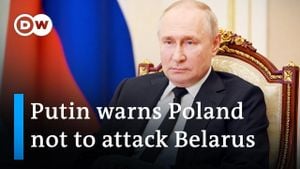The recent violent protests shaking Georgia have captured global attention, as citizens express their frustrations over the ruling party's recent decisions. The catalyst for these escalations was the Georgian Dream party's unexpected announcement to suspend talks on European Union (EU) accession until at least 2028, which sparked fears of increased Russian influence.
These protests reflect long-standing sentiments among the Georgian populace, many of whom are eager for closer ties to Europe. The suspension of talks has ignited feelings of betrayal, pushing approximately 200,000 protesters to the streets of the capital, Tbilisi. Demonstrators raised their voices against what they perceive as backsliding on their aspirations for EU integration and democratic reforms.
Georgia's aspirations for EU membership gained momentum following the country's official candidate status granted by the European Council back in December 2023. This milestone was celebrated by many as it aligned with pro-Western sentiments across successive governments. But the recent political maneuvering by the Georgian Dream party resounded deeply, giving rise to fears of returning to Russia's orbit after years of striving for independence.
The protests featured vivid symbols of resistance and defiance, with protesters chanting slogans calling for political accountability and transparency. Many youthful faces occupied the city's streets, holding placards emblazoned with messages against Russian control, drawing parallels to the earlier Euromaidan protests seen in Ukraine.
The Georgian Dream party, the ruling party with close ties to Moscow, has been accused of undermining the independence gained after the collapse of the Soviet Union. Public discontent has grown as citizens perceived the party to be aligning more closely with Russian policies, particularly following the suspension of EU talks. The situation has escalated tensions, leading to clashes between demonstrators and police.
Local authorities responded to the burgeoning protests with increased vigilance, implementing measures to quell dissent, including mass arrests and dispersal actions. Despite attempts to intimidate demonstrators, many remained unyielding, underscoring their determination to see political reforms and transparency. The public's demands are not only for political change but also for societal shifts toward European integration.
The protest atmosphere is charged, with many seeing their actions as pivotal for the country's future. This is particularly pertinent considering the historical backdrop of Georgia’s tumultuous relationship with Russia, especially since the 2008 war over the separatist regions of South Ossetia and Abkhazia.
Adding fuel to the fire was the Georgian parliament’s discussions around the controversial “foreign agent” legislation, which many perceived as echoing Kremlin policies aimed at stifling dissent and controlling democratic movements. Critics assert this law threatens civil society by forcing non-governmental organizations and media outlets to register as foreign agents if they receive external funding.
This proposed legislation emphasizes concerns among Western allies about the potential erosion of democracy and civil liberties within Georgia. The EU has warned Georgian authorities against steps perceived to undermine democratic norms and institutions, urging the ruling party to adhere to the commitments made during the EU membership application process.
International observers are keeping close tabs on the developments. The situation is viewed with concern not only for Georgia’s internal stability but also for the larger geopolitical dynamics between Russia and the West. Many analysts interpret the protests as representative of broader regional resistance against Russian influence and interference.
On the ground, solidarity among protesters transcends political lines, with various civil organizations and opposition parties joining the movement against the ruling party's decisions. These coalitions signal a unified front advocating for progressive changes and emphasizing the importance of Georgia’s ties to NATO and the EU.
Despite the clashes, some voices within the government express willingness to engage with public sentiments. Debates are taking place on how to navigate this turbulence without compromising the longstanding ambitions for EU integration. Negotiations are expected as various factions within the party deliberate over the future course of action.
History has shown Georgia's resilience against authoritarian tendencies. The protests are not merely isolated events but part of continuing struggles for democracy and self-determination shared globally, especially within former Soviet states where Russian influence looms large.
Whether these protests result in tangible change remains to be seen. Yet the fervor of citizens voicing their angles has brought renewed hope and energy to the political discourse, reflecting deep-rooted desires for autonomy and alignment with European principles over Russian dominion.
The coming weeks will prove to be significant as both the government and opposition will face pivotal decisions on how to navigate this challenging period. Leaders of the protests have promised to maintain momentum, indicating no signs of backing down until their voices are heard and validated.
With Georgia's future hanging by a thread between East and West, the outcome of these protests could define the nation’s direction for years to come. The world watches, ready to respond to whatever narrative emerges from this crossroads.



